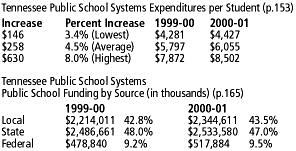
Education costs
In his [April 11] letter, Bill Dunn says that Tennessee has doubled the amount of money spent on K-12 education and got nothing for it in test-score results. The Annual Report 2001 issued by the Tennessee Department of Education lists the following figures:

Nowhere is there anything about doubling the amount spent on students, in these tables or anywhere else in the report.
What has increased according to this report? 1. The number of students in Tennessee schools has increased steadily since 1991 (p. 3). 2. The number of students in Title I programs (i.e. children in poor families) (p. 11). 3. The number of students whose native language is not English in rural and urban schools (p. 25). 4. The number of students suspended or expelled. (p. 49) 5. The percentage of students performing competently or better on the TCAP writing test in grades 4 and 7 (p. 71). 6. The percentage of students passing the TCAP mathematics and language-arts competency test (p. 81).
The record shows that Tennessee has put fewer dollars into schools in percentage terms. There are more students in Tennessee schools and more students whose English is poor or non-existent. Despite the additional burdens and drop in state contributions, Tennessee public schools have improved a number of important test scores. Why doesn't Rep. Dunn highlight this increase in efficiency in public education?
In the private schools Rep. Dunn loves, each additional student brings on average an additional $10,000 in tuition. In the public schools Rep. Dunn criticizes, each additional student brings additional needs, but no additional dollars, unless the Legislature or county board gets around to providing them. In the public schools Rep. Dunn criticizes, the average school systems spend about $6,000 per student, while private school tuition averages $10,000. So why does Mr. Dunn say more money doesn't help education—just "natural intelligence, involved parents and a willingness to learn"?
If private schools are better, it is because they have more money to work with, have smaller class sizes and can refuse any student they don't want. Is it in our interest to have Tennesseans of the future well educated? If so, are we willing to pay even close to what it costs to educate a select group of educationally advantaged students whose parents are involved enough to put up $10,000 a child?
Honesty in reporting the numbers and comparing the systems would help improve education in Tennessee. I would like to think we all want better education for the entire next generation of Tennesseans, not just the already privileged ones. Good education, even when it is as efficient as current public education is, costs money—more money than what the state of Tennessee is currently providing.
Jeff Mellor
Knoxville
| 




